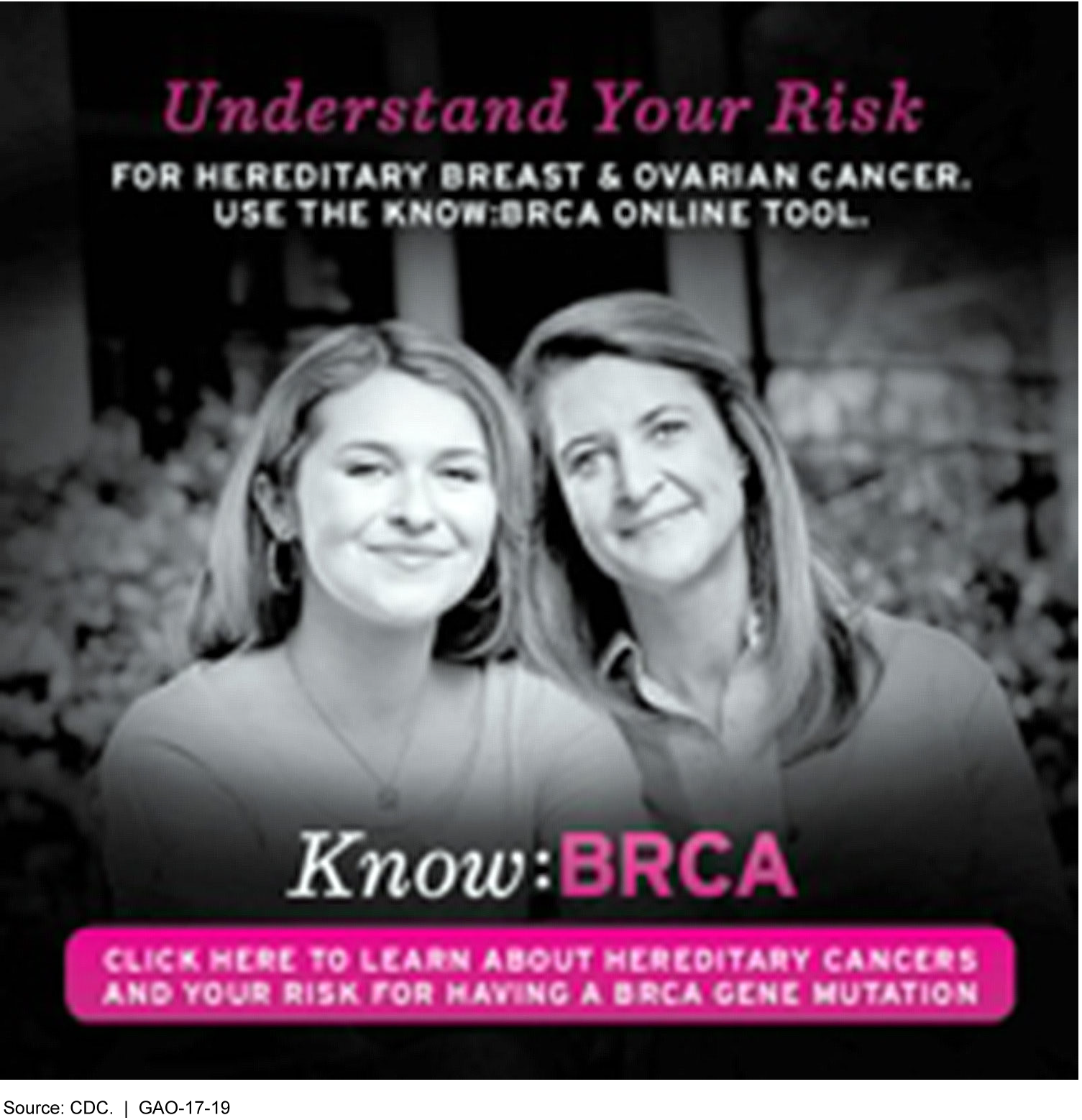Breast Cancer Education: HHS Has Implemented Initiatives Aimed at Young Women
Fast Facts
Young women account for 11% of all new cases of breast cancer in the United States, tend to have worse outcomes than older women, and face unique issues in managing the disease.
We looked at the Department of Health and Human Services' efforts to provide breast cancer education and support to young women as required by law. Among its activities, HHS used social media to launch these campaigns targeted to young women:
Know: BRCA—an interactive tool that helps women assess their risk of developing cancer, and
Bring Your Brave—an online resource that includes testimonials from young breast cancer survivors.
CDC Promotional Material for the "Know: BRCA" Campaign

An image from CDC's "Know: BRCA" interactive web tool to assess cancer risk
Highlights
What GAO Found
The Centers for Disease Control and Prevention (CDC), within the Department of Health and Human Services (HHS), has led federal efforts to respond to four areas specified in the Young Women's Breast Health Education and Awareness Requires Learning Young Act of 2009 (EARLY Act). CDC reported spending nearly $37 million between fiscal years 2010 to 2016 on the following efforts across the four areas specified in the act:
- Prevention research: CDC developed research in areas such as the economic implications of breast cancer, infertility, and survivorship, as well as participated in research conducted by the National Institutes of Health (NIH).
- Public education campaign: To educate women at risk of or living with breast cancer, including those with a breast cancer susceptibility gene (BRCA) mutation, CDC launched Know : BRCA —an interactive web resource that enables women to determine their potential breast cancer risk—in 2014, and Bring Your Brave —a web-based campaign—in 2015.
Centers for Disease Control and Prevention (CDC) Promotional Material for Know: BRCA

- Support grants: CDC awarded 14 grants to entities that increase education and awareness, and provide support programs for young women with breast cancer—particularly the target populations specified in the EARLY Act.
- Health professional education campaign: Efforts for this campaign are more recent and have focused on developing continuing education case studies for providers and provider components of Know: BRCA and Bring Your Brave . CDC officials are beginning to work with the Health Resources and Services Administration (HRSA) to reach providers.
GAO determined that HHS's targeted breast cancer education campaign for young women leverages existing resources, but does not duplicate other federal breast cancer education efforts, which are more general in nature. Additionally, a breast cancer expert noted that breast cancer education for young women is new and evolving, thus, further limiting the possibility that recent efforts are duplicative.
Why GAO Did This Study
While most breast cancer is detected in older women, breast cancer also affects young women (defined as women under 45 years old). Researchers have found that young women affected by breast cancer tend to be diagnosed at a later stage, experience worse outcomes, and face unique issues in their treatment, such as effects on fertility. The EARLY Act requires HHS to provide breast cancer education and support specifically for young women. The 2014 reauthorization of the act included provisions that GAO identify HHS activities to provide breast cancer education, and assess whether such activities are duplicative of other federal breast cancer education efforts. This report addresses (1) HHS's efforts to provide or support breast cancer education for young women, and (2) whether these efforts for young women duplicate other federal breast cancer education efforts.
In conducting this work, GAO reviewed federal laws, federal internal control standards, GAO's Fragmentation, Duplication, and Overlap Guide, as well as HHS's documentation of EARLY Act efforts and spending; and interviewed officials at HHS agencies with roles implementing the act, including CDC, HRSA, and NIH. GAO also interviewed officials from seven research and advocacy groups who were selected based on the populations they represent, and searched 17 federal websites, which were selected based on GAO's research and referrals by breast cancer experts.
HHS provided technical comments on a draft of this report, which GAO incorporated as appropriate.
For more information, contact Marcia Crosse at (202) 512-7114 or CrosseM@gao.gov.
